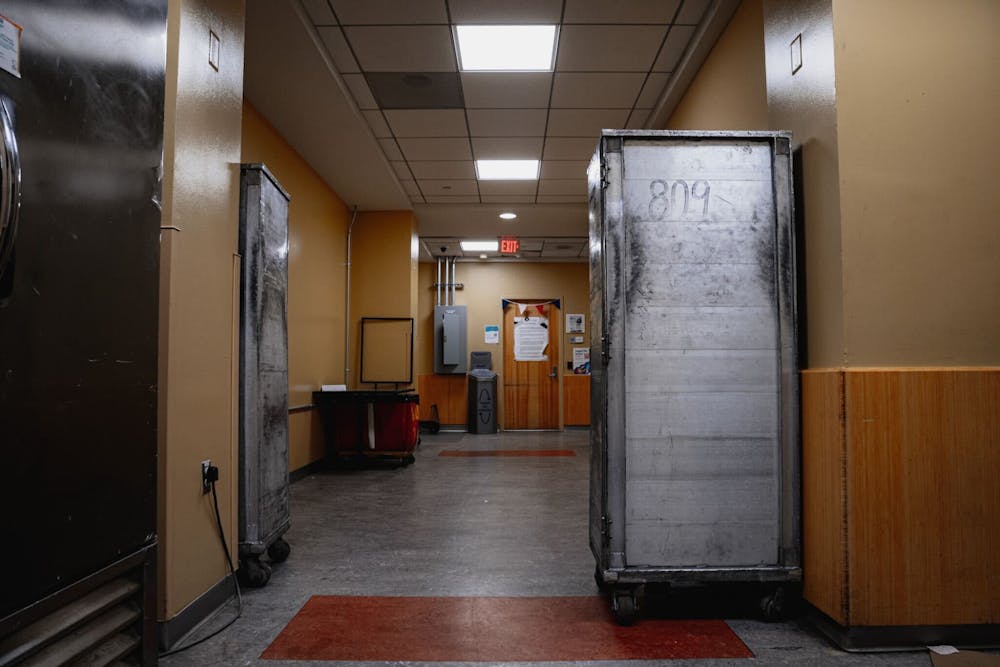A growing number of undergraduate and graduate students at American University are turning to The Market, AU’s on-campus food pantry, for meal support, reflecting a national trend of increasing food insecurity amongst college students.
The Market, which operates on a donation-based model, was visited over 1,500 times in the fall 2023 semester, and more than 338 students signed up for the Markets’ services, according to Student Support Coordinator Taylor Allgood.
“There’s often a misconception that if you can afford college, you can afford everything else,” Allgood said. “But that’s not the reality for many students. Rising living costs, tuition and other financial burdens make resources like the AU Market essential.”
The Market, housed near Panera Bread in Mary Graydon Center 134, provides students with a variety of food items, including fresh produce, leftover bread from Panera, canned goods, snacks and hygiene products.
The Market relies on donations from businesses, alumni donors, on-campus food donation boxes and corporate partnerships, such as one with the University’s dining contractor, Chartwells. The AU Pantry is not funded by the University, which makes community support vital to its operations.
Salvatore Cottone, a senior in the School of Public Affairs, works at the pantry and understands its necessity for many students.
“Before I started working here, I relied on the pantry every semester when my meal plan ran out,” Cottone said. “Without it, I wouldn’t have known where to get my food. The pantry provides not just food but also a sense of security for students.”
Food insecurity is rising among college students in the U.S. The Temple University Hope Center Report found that 34 percent of college students in 2020 self-reported experiencing food insecurity. Their most recent report, which concluded in July 2024, found that that number had risen to 41 percent.
“Ultimately, our goal is to alleviate [the financial burden] as much as possible and minimize as many barriers as we can for students to be able to stay in school,” Allgood said.
Students may gain access to the Market’s supply without any proof of need by filling out a Market Access Form located on their website.
“We want to eliminate as many barriers as possible so that students feel comfortable using our services,” Nancy Zou, a sophomore in the Kogod School of Business, who works at the pantry, said.
According to Zou, many of the students who use the pantry are graduate students, as they often face more financial strain due to housing costs and limited financial aid options.
“They juggle tuition, rent, and other expenses, and the food pantry is a necessary resource for them,” Zou said.
While The Market has seen increased participation, staff and volunteers say many students are still unaware of its existence.
“Marketing and outreach remain our biggest challenges,” Zou said. “When I tell people I work at the food pantry, they’re often surprised to learn that we even have one.”
Beyond providing food, The Market also offers other critical resources, such as the Eagles Helping Eagles program, which supplies meal swipes to eligible students, and one-on-one SNAP enrollment consultations with Allgood. The pantry has also introduced sustainability efforts, including composting perishable food waste and collaborating with the University’s Zero Waste team to reduce environmental impact.
“Food insecurity isn’t just about having access to any food—it’s about having access to nutritious food,” Cottone said. “We want students to know they don’t have to go hungry on campus.”
The pantry hopes to expand its reach through increased student engagement, donation drives and advocacy.
“We are the only country in the world that doesn't define food as a right, we define it as a privilege,” Cottone said. “As [American University] costs increase, students are going to be less likely to go on certain meal plans, and are going to rely more often on resources like the food pantry.”
This article was edited by Cara Halford, Tyler Davis and Abigail Turner. Copy editing done by Luna Jinks, Sabine Kanter-Huchting and Hannah Langenfeld.





